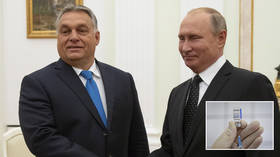Hungary, newest battlefield in Western media’s Covid-19 information war, still open to Russia Sputnik V jab – if enough available

Hungary’s Prime Minister Viktor Orban has played down suggestions that his government will rule out the use of a Russian coronavirus vaccine, despite reports to the contrary in Western state-funded media outlets.
In an interview with Budapest-based Kossuth Radio on Sunday, Orban set out his administration’s approach to immunizations, reporting that eighty-thousand doses are already available in the Central European Country.
According to local media, he also emphasized that, while “vaccines from the West are managed by the European Union,” he is “not happy with the pace, because there are manufacturers whose products were available earlier in Canada, Britain, Israel and elsewhere in the EU.”
Also on rt.com Russian Army & Kremlin say foreign states & pharma giants waging information war to discredit Sputnik V Covid-19 vaccineAs a result, he said, the country was considering reaching separate deals with manufacturers, outside of Brussels’ scheme. However, at present, companies are struggling to communicate reliable timelines for when shipments might be made available. “If there’s a vaccine here, we can use it. If there are many, we can vaccinate a lot,” Orban added.
One of the jabs that Budapest had explored using is Sputnik V, developed by scientists at Moscow’s Gamaleya Center. In November, a shipment of vials of the Russian formula touched down in the capital, enabling Hungarian scientists to assess its safety and efficacy. The move drew criticism from Brussels, which insists that its own regulator must first approve a vaccine before it is rolled out. Sputnik V has not been among those included in EU procurement schemes.
In Sunday’s interview, Orban set out that, while “the Russian vaccine is good,” it may not be good enough and is among those that Budapest would struggle to secure sufficient quantities of. While Russia has been exporting vials to countries including India and Argentina, it is also working to roll out the jab to almost 150 million of its own citizens, limiting the numbers of doses that might initially be available to other nations.
However, he continued to defend his two-track approach to securing supplies of the jab, lavishing praise on formulas developed in China and insisting that, “in an ideal world, you should have a chance to choose whether you receive a Western or Chinese vaccine.” He added that his government would continue to monitor formulas developed in the East, before making a final decision.
Also on rt.com Director of Soros-funded HRW slammed for accusing Hungary of ‘scoring political points’ with imports of Russia's Sputnik V vaccineWestern state-funded media, however, had previously been more downbeat about Hungarians’ prospects of receiving the Russian jab. Radio Free Europe, the American state-run broadcaster, reported on comments from Orban’s Chief of Staff in December, saying that the country “won’t use Russia’s Sputnik V vaccine, despite bilateral co-operation.” It added that Orban had faced criticism “as he has deepened bilateral ties with Russian President Vladimir Putin, who has viewed Sputnik-V as a national prestige project.”
The Moscow Times, which, despite its name is not a Russian publication but instead Dutch state-funded, similarly reported on Orban’s most recent comments, adding that “critics have also described Sputnik V as a tool to bolster Russia’s geopolitical influence.”
In December, Kremlin spokesman Dmitry Peskov told journalists that “some countries and their giant pharmaceutical companies” are working hard to prevent Sputnik V entering the foreign market. “These aspirations are not just noticed by the Kremlin, but they are visible to the naked eye,” Peskov said. “The competition is very tough, but it is good when this competition is, in fact, fair.”
Russia’s Ministry of Defense has previously suggested that a foreign-funded information war is being fought against the country’s jab, with Major-General Igor Konashenkov stating that “we know, in detail, what funds and resources are being given by foreign countries to discredit the domestic vaccine, in the world and in Russia.”
Like this story? Share it with a friend!














